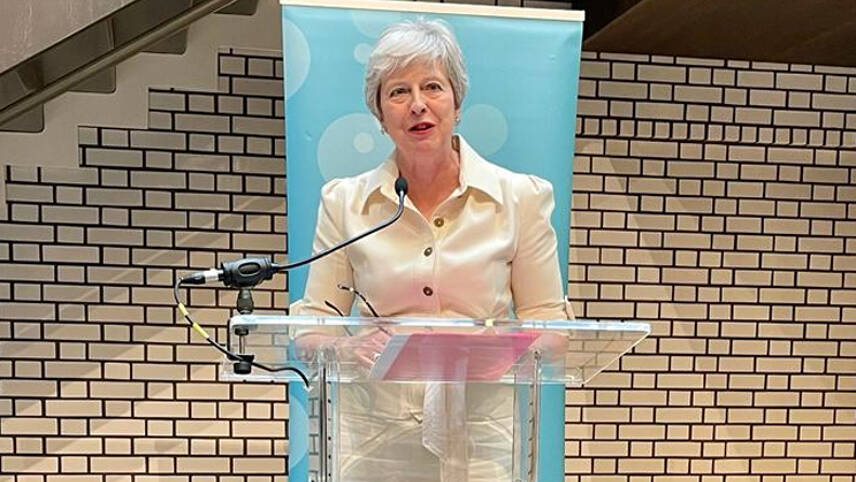Register for free and continue reading
Join our growing army of changemakers and get unlimited access to our premium content

May delivered a speech at the annual summer reception for the Aldersgate Group in London on Tuesday evening (12 July) – her first public speech since Boris Johnson announced his resignation as Conservative Party leader and Prime Minister last week.
May, who chairs the influential business coalition, used her position to argue that the need to act on climate mitigation and adaptation should be a policy priority which transcends leaders, and cannot be paused in this critical decade.
She said: “Ministers come and Ministers go. Prime Ministers come and Prime Ministers go. But many issues remain the same. Particularly important key issues, like dealing with climate change and the degradation of nature. What we must remember is that, whatever else happens, this is absolutely critical for the future of our planet for the future of people’s lives and their jobs and their prosperity. And we must not take the foot off the accelerator at all.”
May noted that “this year, we’ve had a number of reports that have brought home to us how important it is to continue on this agenda”. These include the landmark reports from the Intergovernmental Panel on Climate Change (IPCC) in February and in April, which respectively provided stark warnings on climate adaptation and reducing emissions rapidly this decade.
More recently, and regarding the UK specifically, the Climate Change Committee (CCC) published its annual progress report to parliament in late June. The report concluded that, despite a string of policy packages being published last year, policy gaps remain and implementation progress remains slow. By the CCC’s estimates, the UK will only deliver one-third of the emissions reductions it has legally committed to by the mid-2030s.
May went on to hint that she has seen some evidence of the metaphorical foot coming off the accelerator, adding: “What I think is fascinating is that, at the moment, there is not just that uncertainty in the background of the changeover [of Conservative Party leaders], but also, of course, with the cost-of-living crisis at the moment and with issues around energy. There’s just that sense that, perhaps, some people might be thinking that net-zero isn’t the way to go.”
Since the beginning of 2022, there has been an increasingly vocal faction of Government falsely claiming that the costs of the net-zero transition would outweigh the benefits, including the Net-Zero Scrutiny Group. This is despite the fact that the Climate Change Committee (CCC) has priced the transition at 0.5-1% of GDP, revising its forecast down from 1-2% of GDP to the falling cost of technologies like offshore wind.
In the Conservative Party leadership race specifically, two of the final eight candidates, Kemi Badenoch and Suella Braverman, have stated that they would like to pause or roll back the UK’s 2050 net-zero target if elected as Prime Minister. No other candidates have made any significant positive comments on net-zero-related policies, much to the disappointment of green groups and some of the nation’s largest businesses.
Braverman has the backing of the Net-Zero Scrutiny Group’s Steve Baker and several of the Group’s other participants. She has stated in a newspaper column that she wishes to “suspend the all-consuming desire to achieve net-zero by 2050” to respond to the near-term challenges such as the energy price crisis. Badenoch has stated that she believes reaching net-zero goes against the Government’s commitment to levelling up.
The Conservative Party intends to choose a new leader in early September.
Economic and social wins
May went on to challenge the idea that net-zero was somehow a contributor to the cost-of-living crisis and implored policymakers to implement solutions which reduce emissions while also reducing bills and building in resilience against future price shocks.
She said: “The absolutely clear message which I give, which Aldersgate gives, which I’m sure you’re all giving, is this: if you want to deal with the cost-of-living crisis, a lot of the things you need to do for net-zero will help.”
Specifically, she spoke to the importance of retrofitting existing buildings and ensuring that new buildings are more energy-efficient. This was one of the areas flagged by the CCC as one of historic, and ongoing, poor progress. Just this week, the Energy Institute’s members called for an “emergency” national home energy efficiency strategy in response to the price crisis.
May also noted the importance of making sure that energy bills are “less dependent on gas”, meaning that domestic generation of low-carbon electricity should be scaled as the Government works to end unabated gas-fired electricity generation by 2035. There is also the need for more clarity on the direction of travel for reducing gas heating in buildings.
Beyond this, May framed the net-zero transition and the need to restore nature as opportunities to create jobs across the UK, contributing the economic recovery from Covid-19 and the Conservative Party’s stated intentions on levelling up. The Government has pledged for the UK to host two million green jobs by 2030 but is not yet on track to achieve this aim.
May’s argument has been made by many individuals, businesses, think-tanks and green groups over the past few months. Late last month, Corporate Leaders Group UK published a report concluding that addressing the UK’s rising energy prices in a “climate-friendly” way would not only cut bills for households and businesses now, but reduce the likelihood of future price spikes and be beneficial to the economy in the short and long term.
Whether this message gets across to the Conservative leadership candidates, or whether climate and environment issues will either get sidelined or falsely deemed uneconomic, remains to be seen.


Please login or Register to leave a comment.